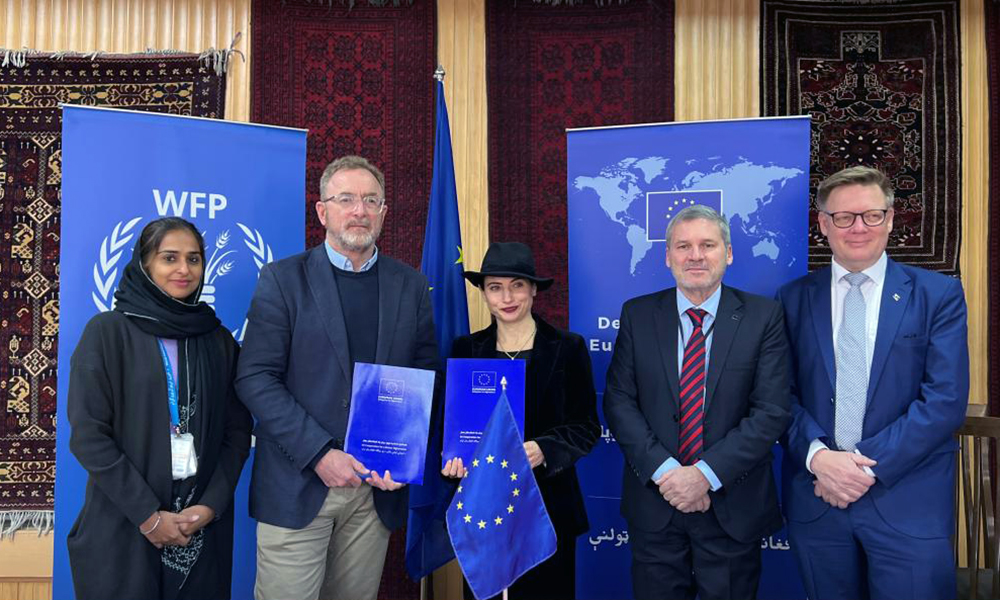Climate Change
After rough start, UN plastic treaty talks end with mandate for first draft

After a rocky start to a week of negotiations, around 170 countries agreed to develop a first draft by November of what could become the first global treaty to curb plastic pollution by the end of next year.
Country delegations, NGOs and industry representatives gathered in Paris this week for the second round of UN talks toward a legally binding pact to halt the explosion of plastic waste, which is projected to almost triple by 2060, with around half ending up in landfill and less than a fifth recycled, according to a 2022 Organisation for Economic Co-operation and Development report.
Though the first half of the five-day negotiations was spent arguing over procedural issues, delegations split into two groups to discuss the range of control measures that can be taken to stop plastic pollution as well as whether countries should develop national plans or set global targets to tackle the problem, Reuters reported.
By the session's close on Friday, countries agreed to prepare a "zero draft" text of what would become a legally binding plastics treaty and to work between negotiation sessions on key questions such as the scope and principles of the future treaty.
The "zero draft" text would reflect options from the wide-ranging positions of different countries by the start of the next round of talks to be held in Nairobi, Kenya, in November.
"My appeal to you at the beginning of this session was that you make Paris count. You have done so by providing us collectively with a mandate for a zero draft and intersessional work," said Jyoti Mathur-Filipp, executive secretary of the Intergovernmental Negotiating Committee (INC) on Plastic Pollution at the closing plenary.
The start of negotiations was bogged down by more than two days focused on the rules of procedure for the talks.
Saudi Arabia, Russia and China led objections to the treaty decisions being adopted by a majority vote rather than a consensus. A consensus would give one or a few countries the ability to block adoption.
Marian Ledesma, a campaigner with Greenpeace Philippines, told Reuters that if the INC process enables adoption by consensus instead of majority voting, it "will block a lot of important provisions."
"Voting allows for as many states as possible to be able to support the treaty and allow us to move forward," she said.
The issue has not yet been fully resolved and will come up at the next round of talks.
Climate Change
Kandahar’s Takhtapul district hit hard by ongoing drought
Afghanistan has experienced three consecutive years of drought, including the most devastating drought in 30 years in 2021 and 2022.

Residents of Takhtapul district of Afghanistan’s Kandahar province say they are struggling to survive amid an ongoing drought that has devastated their crops.
This rural community mainly relies on agriculture to survive but climate change has virtually ended any hopes of farming.
Afghanistan has experienced three consecutive years of drought, including the most devastating drought in 30 years in 2021 and 2022.
Climate experts predict that by 2050, 90% of its territory will be affected by drought.
Afghanistan is one of the ten countries most vulnerable to climate change. It's also ranked fourth in overall disaster risk.
Takhtapul residents have spoken out about their plight and said they have sustained extensive losses due to the drought
They said in the past they had made a living off farming, but now due to the severe lack of water, their land has become barren.
They also said this is forcing their youth and younger generation to find work in other provinces or outside the country.
Abdullah, a resident of Takhtapul district of Kandahar, said: "Our youths have gone to Pakistan and other provinces in search of work due to unemployment and drought. There they have wheelbarrows [for day labourer work] or they do other jobs."
On the other hand, local officials say that they are trying to reduce unemployment by launching development projects in this district.
Along with droughts and lack of work for young people, the breakdown of roads, lack of health centers and lack of suitable places for education are among the problems that the residents of this district want to solve.
Climate Change
EU pledges €15 million to WFP to help mitigate climate crisis impact on Afghans

The United Nations World Food Programme (WFP) has welcomed a €15 million (US$15.8 million) contribution from the European Union (EU) for its climate related activities in Afghanistan.
According to a statement issued by the EU on Thursday, this contribution will help local communities prepare for natural disasters and face the devastating effects of climate change, and support farmers for more productive and sustainable agriculture.
So far this year, more than 160,000 people have been affected by flooding in Afghanistan. Floods have destroyed almost 20,000 homes, and thousands of hectares of agricultural land.
“The European Union is committed to assisting the people of Afghanistan in adapting to climate change, which is severely threatening food security and livelihoods notably of rural communities, said the EU Chargée d’Affaires to in Afghanistan, Veronika Boskovic Pohar.
“Climate-related shocks also exacerbate host communities’ capacity to support internally displaced people and returnees from neighboring countries, and they discourage farmers in poppy-cultivating areas from sustainably shifting to licit crops.
“This latest contribution increases the European Union’s steady support to WFP’s resilience programme in Afghanistan to a total EUR 85.1 million since 2022”, she said.
Harald Mannhardt, WFP Deputy Country Director in Afghanistan, said: “This latest funding from the European Union comes at a critical moment as WFP earlier this year was forced to halt projects across the country due to a massive funding shortfall.”
Afghanistan is currently ranked seventh on the Notre Dame Global Adaptation Index of countries most vulnerable and least prepared to adapt to climate change.
Climate Change
Malaysia records six months of rain in just five days
One of the worst hit areas was Kelantan which recorded 1,442mm of rain between November 26 and 30

Six months worth of Malaysia’s average annual rainfall fell within five days across the east coast of the country last week, Prime Minister Datuk Seri Anwar Ibrahim said early Tuesday.
One of the worst hit areas was Kelantan which recorded 1,442mm of rain between November 26 and 30.
Ibrahim said the high rainfall led to flooding that forced a large number of people in Kelantan and Terengganu to be evacuated.
The recorded rainfall at Irrigation and Drainage Department stations in Tanah Merah and Tumpat, exceeded 1,167mm in just five days.
“According to the Malaysian Meteorological Department (MetMalaysia), the reading (in Kelantan) was at 1,442mm, an extraordinarily high level of rainfall. In Terengganu, MetMalaysia’s Besut station recorded 1,761mm of rain during the same period.
“Overall, the (average) rainfall was 1,349mm, far beyond our expectations,” Anwar told the Dewan Rakyat (Parliament) on Tuesday.
He also said the government is preparing for the forecast monsoon surge as announced by MetMalaysia, expected to start after Dec 8.
By Tuesday, some residents in the town of Tumpat were returning to submerged homes and shops as deadly floodwaters eased in some areas.
People who returned to their homes found many had collapsed, with parts of walls, roofs and broken furniture lying scattered in pools of water.
Muhamad Alim, a 56-year-old shopkeeper whose food store was inundated, recalled fast-rising waters in his home and his grandchildren crying as the flood surged on Saturday night.
"Electricity was cut off, and there was no water supply. So, we were stuck, sitting there as if we were in the middle of the sea, surrounded by water," he told Reuters.
"You could hear the sound of water rushing cutting through the silence of the night."
Six people have died in Malaysia and more than 150,000 were evacuated during the height of the floods last week, government data showed.
In Thailand, the death toll is 25, and more than 300,000 households were still affected, the interior ministry said.
The number of people in temporary shelters in Malaysia fell to just under 95,000 on Tuesday morning, though the authorities remain on guard for a second wave of floods this week.
Malaysia's Meteorological Department expects a wind convergence to begin on Tuesday, potentially bringing heavy showers, with a monsoon surge to follow on Dec. 8.
In Thailand, the Meteorological Department warned people in the south of the country to beware of heavy to very heavy rains and possible flash flooding and overflows from Dec. 3-5.
-

 Latest News4 days ago
Latest News4 days agoAfghanistan seals T20I series victory over Zimbabwe
-

 World5 days ago
World5 days agoSyrian clerics in former Assad stronghold call for national unity, democracy
-

 Latest News5 days ago
Latest News5 days agoU.S. sentences Afghan man to 30 years in prison for narco-terrorism and witness tampering
-

 International Sports4 days ago
International Sports4 days agoMessi vs Ronaldo: A look at their market values over the years
-

 Latest News5 days ago
Latest News5 days agoInvestment in Afghanistan’s pharmaceutical sector reaches $300 million: Union
-

 Latest News5 days ago
Latest News5 days agoChinese, Tajik officials discuss Afghanistan
-

 Sport5 days ago
Sport5 days agoAfghanistan’s Gulbaddin Naib fined 15% of match fee for dissent
-

 Regional4 days ago
Regional4 days agoHezbollah chief says group lost its supply route through Syria
























